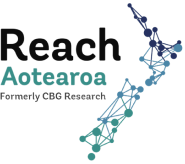- Formative evaluations try to develop or improve programmes, and are usually carried out as the programme is being set up. There is an expectation that a service will evolve rapidly in its early stages, and formative evaluations are designed with this in mind.
- Process evaluations aim to assess and state the value of service components. The evaluation is usually carried out over a longer period of time compared to a formative evaluation, and the data gathering is continuous and inductive.
- Outcome evaluations assess the effects of service operations on their target populations. In this type of evaluation, given that both intended and unintended outcomes should be examined, the autonomy of the evaluator from the service is usually an important consideration.
Our approach is centred on the goals of the service. However, care is taken not to ignore unintended impacts or outcomes. These can be critical to comprehensive evaluation. Reach Aotearoa presents the proposed methodology for the evaluation, and a project plan is jointly agreed upon. We give advice about data collection, and aim to involve service professionals and up-skill individuals wherever relevant and possible. In this way, a Reach evaluation is unobtrusive as possible; an asset to, and not a test of, services.

